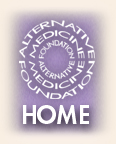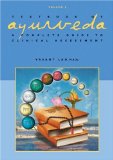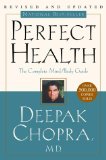AYURVEDA
AN ALTERNATIVE AND COMPLEMENTARY MEDICINE RESOURCE GUIDE
From the Alternative Medicine Foundation, Inc.
Contents:
![]() Introduction
Introduction
![]() Books
Books
![]() Professional Organizations
Professional Organizations
![]() Research and Training Centers
Research and Training Centers
![]() Self-Help Organizations and Treatment Centers
Self-Help Organizations and Treatment Centers
![]() Web resources
Web resources
For additional resources on relevant Alternative and Complementary Resources, see our Resource Guides on:
![]()
Developed in India more than 5,000 years ago, Ayurveda is thought to be the oldest medical system known. According to Hindu mythology, it is the medicine of the gods. Today, it is practiced less as a religion and more as a way of life. It is a complete and holistic science of healthy balanced living that views each person as an individual, with a unique mind-body constitution and set of life circumstances. All these factors are considered in determining whether natural healing approaches should be taken, or if changes in daily living should be made to aid in healing and to promote longevity.
Ayurveda is based on the belief that the natural state of the body is one of balance. We become ill when this balance is disrupted, with specific conditions or symptoms indicating a specific disease or imbalance. Ayurveda emphasizes strengthening and purifying the whole person, whereas in conventional medicine, the focus is on a set of symptoms or an isolated region of the body.
Currently in the United States, there are two adaptations of classical Ayurvedic medicine being practiced. Maharishi Ayur-Veda was started within the past decade by Maharishi Mahesh Yogi, the Hindu swami best known for popularizing Transcendental Meditation. Most of the published studies of Ayurveda are on this type, which concentrates on consciousness and meditation as key in health and healing. The more traditional type of Ayurveda was recently popularized by Dr. Deepak Chopra, a Western-trained endocrinologist. While advocating the use of meditation, this type places more emphasis on the other Ayurvedic mind-body modalities such as yoga, breathing and massage therapy, in an attempt to regain balance.
Basic Principles of Ayurveda
Ayurveda is Sanskrit for the "knowledge of life," defining the trinity of life as body, mind and spiritual awareness. This concept is often neglected in western medicine where thoughts and feelings are often separated from illnesses of the body.
It is believed that all life is based on an underlying force or vital energy called prana, which is centered around various energy centers in the body called chakras.
Patients have a personal responsibility in their own health. It is possible for patients to be healthy, if they maintain a positive perspective and believe in their good health.
The Three Doshas
Ayurveda states that every living thing in the universe is made of five elements. In humans, these elements correspond to the five senses:
Earth or Prithvi = Smell
Water or Apa = Taste
Fire or Tejas = SightAir or Vayu = Touch
Space or Akash = Hearing
According to Ayurvedic teachings, these five elements constitute three primary life forces or doshas. The three doshas, called Vata, Pitta, and Kapha, can be found in every cell in every human, in a combination unique to each individual. Such a combination is called a tridosha. While some people may be characterized by a single dosha, most people are combinations of two or more. Whichever constitutional type dominates determines the dosha type of that person. Each dosha type is associated with characteristic tendencies which facilitates diagnosis for the physician or practitioner.
VATA TYPE
This dosha is composed of the space and air elements and tends to be slender (lightest of the three body types) with cool dry skin and dry hair. They are creative and quick to grasp new ideas, but also quick to forget. Vatas are characterized by unpredictability, enthusiasm, and variability in diet and sleep. They tend to have high energy in short bursts but tire easily and overexert.
Vatas are prone to headaches, hypertension, anxiety, dry coughs, sore throats, earaches, insomnia, irregular heart rhythms, premenstrual syndrome, abdominal gas, diarrhea, nervous stomach, constipation, muscle spasms, lower back pain, sexual dysfunctions, arthritis and nervous system problems.
PITTA TYPE
Pitta types are made of fire and water, are usually of medium build and strength, and are able to easily maintain their weight. They tend to be intense, short tempered, sharp-witted, passionate, have strong digestion, and a strong appetite. Pittas are orderly, efficient, assertive, and self-confident, but can become aggressive, demanding and pushy. They are fairly predictable in their routines as they eat three meals a day and sleep eight hours a night. Generally, their complexion is fair or reddish, often having freckles, and their hair is usually fine and straight, tending toward blond or red.
Typical health problems include heartburn, ulcers, hot sensations in the stomach or intestines, insomnia, rashes or inflammations of the skin, acne, skin cancer, anemia, and gallbladder and liver disorders.
KAPHA TYPE
Kapha is composed of earth and water with a solid, strong, heavy body type, and soft hair and skin, usually with large soft eyes and a low, soft voice. They tend to gain weight easily and need a lot of sleep and warmth. Kaphas are usually relaxed, graceful, slow-moving and affectionate. They are forgiving, compassionate, nonjudgmental, and faithful. This dosha type has the most energy of all the constitutions, but it is steady and enduring, not explosive. They procrastinate and are slower to learn but have excellent long-term memories.
Although Kaphas generally have a strong resistance to disease, they are prone to obesity, allergies, colds, congestion, sinus headaches, respiratory problems, atherosclerosis, and painful joints.
Physiological Principles
DHATUS: These are the seven basic tissues which maintain and nourish the body. The proper amount of each dhatu and its balanced function is very important for good health.MALA: These are the waste materials produced as a result of various metabolic activities in the body. Proper elimination of the malas is equally important for good health, as their accumulation causes many disease.
SROTAS: These are different types of channels which are responsible for transportation of food, dhatus, malas and doshas. Blockage causes disease.
AGNI: These are different types of enzymes responsible for digestion and transforming one material to another.
These physiological factors are inter-related and are directly or indirectly responsible for maintaining equilibrium of the tridoshas, and therefore health.
Aim of Ayurveda
The aim of Ayurveda is to simply achieve and maintain health by reaching a state of balance or equilibrium among the three doshas, which govern all bodily functions. All physical manifestations of disease result from imbalances in the doshas, and various foods and emotions either stabilize or disturb this balance.
For preventing disease, Ayurvedic methods use a regimen called panchakarma to cleanse and rejuvenate the body, mind and consciousness. Evaluation of the three doshas is primarily accomplished by nadi vigyan, which is a detailed and systematic technique of pulse diagnosis. A full medical exam also includes examination of the tongue, voice, eyes, skin, urine, stools, and general appearance. To aid in healing, practitioners and physicians recommend lifestyle interventions in nutrition, herbs, exercise, yoga, and massage therapy.
![]()
NOTE: The following resource listings are not intended to be comprehensive, nor to be used as a guide for treatment. They are provided for information only. The resources are selected and categorized to help you with your own research.
Selected Amazon links are available below; over 90 titles pertaining to Ayurveda or Ayurvedic medicine, with prices in US dollars are available at the Indian Books Center.
AUTHORITATIVE RESEARCH RESOURCES
| Vasant Lad, M.A.Sc. Textbook of Ayurveda, Volume Two: A Complete Guide to Clinical Assessment Ayurvedic Press, 2007 Building upon the information in Volume One, Lad describes the many categories and stages of disorders and disease from the ancient texts of Ayurveda, and demonstrates how to detect and evaluate the conditions of the client. |
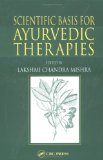 |
Lakshmi C. Mishra, M.Pharm, Ph.D. (Editor.) Scientific Basis for Ayurvedic Therapies CRC Press, 2003 Over three dozen experts analyze and synthesize current research supporting Ayurvedic medicine, providing a critical evaluation of literature, clinical trials, and biochemical and pharmacological studies on major Ayurvedic therapies. |
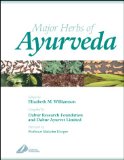 |
Elizabeth M. Williamson, D.Pharm. Major Herbs of Ayurveda Churchill Livingstone, 2002 This clinical reference text features comprehensive and detailed profiles of 50 key herbs used in Ayurvedic medicine, and includes full-color photos of each plant. |
| Vasant Lad, M.A.Sc. Textbook of Ayurveda, Volume One: Fundamental Principles Ayurvedic Press, 2001 Founder of the Ayurvedic Institute (listed below), Lad conveys the philosophical and fundmental principles of his first year Auurvedic Studies Program. |
| Deepak Chopra, M.D. Perfect Health: The Complete Mind/Body Guide Updated edition Harmony Books, 2001 Provides a tailored program of diet, stress reduction, exercises, and daily routines for reestablishing the body's natural balance, strengthening the mind/body connection, and using the power of quantum healing to transcend disease and aging. This new edition is updated from the 1991 original to include the latest medical research. |
 |
Vasant Lad, M.D. and David Frawley, O.M.D. The Yoga of Herbs: An Ayurvedic Guide to Herbal Medicine Lotus Light Publications, 2nd Revised Edition, 2001 A detailed Ayurvedic explanation and classification of herbs. Included are more than 250 herbs, diagrams and charts, and a detailed glossary. |
| David Frawley, O.M.D. Ayurvedic Healing: A Comprehensive Guide, 2nd revised edition Lotus Press, 2000. Contains detailed Ayurvedic methods of balancing and treatment of common disease. General information for the layperson and specific knowledge of diet, herbs, oils, aromas and mantras. An expanded version of the original edition, covering additional diseases and adding new treatments |
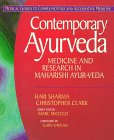 |
Hari Sharma and Christopher Clark Contemporary Ayurveda: Medicine and Research in Maharishi Ayur-Veda Churchill Livingstone, 1997 Presents the foundations of Maharishi Ayur-Veda's approach to physiology and anatomy, detailing daily and seasonal routines for disease prevention. |
 |
David Frawley, O.M.D. Ayurveda and the Mind: The Healing of Consciousness Lotus Light Publications, 1997 Explores the psychological aspect of Ayurveda, specifically, how to heal our minds on all levels of consciousness. |
 |
Deepak Chopra, M.D. Creating Health: How to Wake Up the Body's Intelligence Houghton Mifflin Company, 1995. Introduces the basic premises of Ayurveda and provides a guide toward a sound understanding of the mind-body connection. |
 |
Vasant Lad, M.D. Ayurveda: The Science of Self Healing Lotus Light Publications, 1984 Discusses the principals and practical applications of Ayurveda, along with fifty concise charts and illustrations. |
CASE STUDIES/OBSERVATIONAL DATA
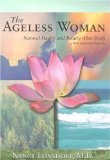 |
Nancy Lonsdorf, M.D. The Ageless Woman: Natural Health & Beauty After Forty with Maharishi Ayurveda MCD Century Publications, 2004 A highly individualized handbook rich in health tips from the Vedic tradition, specifically, how to heal our minds on all levels of consciousness. |
 |
Vasant Lad, M.A.Sc. The Complete Book of Ayurvedic Home Remedies Three Rivers Press, 1999 This guide provides self-analysis charts to determine one's constitutional type and describes remedies and routines for over 120 health conditions. Includes a resource list and glossary. |
 |
Peter Anselmo and James S. Brooks, M.D. Ayurvedic Secrets to Longevity and Total Health Prentice Hall, 1996 A comprehensive step-by-step guide for becoming informed on Ayurveda and the effective use of Ayurvedic methods. |
 |
Judith Morrison and Robert Svoboda The Book of Ayurveda: A Holistic Approach to Health and Longevity Fireside, 1995 A practical guide to the fundamentals of Ayurveda. Describes a constitution-specific system for healthful living including a daily regime of exercise, diet, meditation, yoga, hygiene, and massage. |
[Back to Contents]
![]()
http://www.ayurveda-nama.org/
620 Cabrillo Ave.
Santa Cruz, CA 95030
800-669-8914
Email: info@ayurveda-nama.org
A non-profit professional trade association representing the Ayurvedic profession in the U.S.A., with the purpose of preserving, improving, and promoting Ayurvedic medicine through the provision of leadership within the Ayurvedic profession. The site includes a practitioner directory.
![]()
American Institute of Vedic Studies
http://www.vedanet.com/
PO Box 8357
Santa Fe, NM 87504-8357
Phone: (505) 983-9385
Fax: (505) 982-5807
Email: vidininst@aol.com
Founded by Dr. David Frawley, this comprehensive program covers all the main aspects of Ayurveda that is covered in two year Ayurvedic programs for foreign students in India. Designed for health care professionals and other serious students, but does not require a medical background. Visit this website for locations of Dr. Frawley's other schools and programs throughout the world.
Ayurvedic Institute
http://www.ayurveda.com/
11311 Menaul Blvd. NE
Albuquerque, NM 87112
Phone: (505) 291-9698
Fax: (505) 291-7572
Email: info@ayurveda.com
Directed by Dr. Vasant Lad, this program is similar in content to that taught in traditional Ayurvedic colleges in India, using a teaching style from an oral tradition, and one of apprenticeship.
California College of Ayurveda (CCA)
http://www.ayurvedacollege.com/
117A East Main St.
Grass Valley, CA 95945
Phone: (530) 274-9100
Fax: (530) 274-7350
Email: info@ayurvedacollege.com
Recognized by Ayurveda Shikshan Mandal, a government-authorized accrediting agency in India, and the American Institute of Vedic Studies, the CCA offers a rigorous two-year program leading to a certificate in Clinical Ayurvedic Specialist (C.A.S.).
Kerala Ayurveda Academies
http://www.ayurvedaacademy.com
Aptos, CA
Austin, TX
Foster City, CA
Los Angeles
San Diego
Seattle
Offers Indian-sourced education with a curriculum based on those of prominent Ayurveda universities in India, in-house, supervised internships for those who want more practical experience, weekend classes and long distance learning.
Maharishi University of Management (Formerly the Maharishi International University)
Institute for Natural Medicine and Prevention (INMP) (Formerly College of Natural Medicine and Prevention)
1000 North 4th Street
Fairfield, IA 52557
Phone: (515) 472-1110
Fax: (515) 472-1179
Email: admissions@mum.edu
From 1999-2006, the CNMP (now INMP) was one of the NCCAM/NIH-funded research centers focusing on cardiovascular disease and aging in African Americans. The INMP offers undergraduate, graduate degree and intern programs in Maharishi Vedic Science, Transcendental Meditation, and Physiology.
The National Institute of Ayurvedic Medicine (NIAM)
http://www.niam.com/
Brewster:
584 Milltown Road
Brewster, New York 10509
Phone/Fax: (875) 278-8700Manhattan:
375 Fifth Ave., 5th floor
New York, NY 10016
(212) 685-8600
Email: ayurveda@niam.com
Recognized as the largest and most authentic resource of information on Ayurveda in the United States. In addition to its own clinical research, the NIAM is involved with other medical and scientific institutions in research on the effect of Ayurveda in the treatment of cancer, asthma, and women's diseases and conditions.
New England Institute of Ayurvedic Medicine/International Institute of Ayurveda
111 Elm St.
Suites 103-1-5
Worcester, MA 01609
Phone: (508) 755-374
Fax: (508) 770-0618
Email: ayurveda@hotmail.com
Offers a one-year certification program of classroom instruction in Ayurveda and additional programs for internship and advanced training programs. Also runs Ayurvedic clinic for panchakarma and other procedures.
![]()
SELF-HELP ORGANIZATIONS AND TREATMENT CENTERS
Ayurvedic and Naturopathic Medical Clinic
http://www.ayurvedicscience.com
2115 112th Ave. N.E. Bellevue, WA 98004-2946
Phone: (425) 453-8022
Fax: (425) 451-2670
Email: Ayurveda@ayurvedicscience.com
Offers all aspects of Ayurvedic and naturopathic medicine. Visit this website to ask Dr. Sodhi health related questions.
The Chopra Center for Well Being
http://www.chopra.com/ccwbwelcome.htm
2013 Costa del Mar
Carlsbad, CA 92009
Toll Free: (888)424-6772
Phone: (760) 494-1600
Fax: (760) 494-1608
Email for medical questions: info@chopra.com
Email for general questions: learn@chopra.com
New York:
www.chopracenterny.com
1710 Broadway
New York, NY 10019
(212) 246-7600
Created by Dr. Deepak Chopra, this center offers therapeutic Ayurvedic treatments, expert medical care, and programs designed to help you integrate healing principles into your life.
Kerala Ayurveda Clinics
http://www.ayurvedaonline.com/ayurveda-clinics
Kerala Ayurveda Clinic at Aptos
9099 Soquel Drive #7
Aptos, CA 95003
Phone: (831) 662-2997
Fax: (831) 662-3888
Kerala Ayurveda Clinic at Foster City
561 Pilgrim Drive Suite B
Foster City, CA 94404
Phone: (650) 341-8400
Fax: (650) 341-8449
Kerala Ayurveda Clinic and Academy
4210 Stone Way North
Seattle, Washington 98103
Tel: (206) 729-9999 ext. 0
Fax: (206) 729.0164
Lotus Herbs and Holistic Health Institute
http://www.lotusayurveda.com/index.htm
4245 Capitola Rd. (at 43rd Ave.)
Suite 103
Capitola, CA 95010
Toll-Free: (800) 815-6887 (81-LOTUS)
Phone: (831) 479-1667
Fax: (831) 479-1951
Email: holistic@lotusayurveda.com (contact form on web site)
Offers Ayurvedic programs and residential panchakarma detoxification and rejuvenation therapy year round. Visit the web site for general information on Ayurveda, to determine your constitutional type, and for recommendations on diet and lifestyle.
Maharishi Medical Centers
http://www.maharishi-medical.com/
The following centers provide Maharishi Ayur-Veda comprehensive programs to enliven the body's own inner intelligence to prevent disease and promote good health.
Maharishi Ayur-Veda Medical Center
http://www.lancasterhealth.com/
679 George Hill Road
Lancaster, MA 01523
Toll-free: (877) 890-8600
Phone: (978) 365-4549
Fax: (978) 368-7557
Email: info@lancasterhealth.com
The Raj
http://www.theraj.com/
1734 Jasmine Ave.
Fairfield, IA 52556
Toll Free: (800) 864-8714 ext. 9000
Phone: (515) 472-9580
Fax: (515) 472-2496
Email: theraj@lisco.com (contact form on web site)
Offers personalized programs from Maharishi rejuvenation therapies to treatments for chronic disorders to restore balance to the mind and body.
![]()
NOTE: Promotional and commercial sites are not included in this listing unless they provide significant impartial information resources.
Ayurveda for the Soul
http://www.torsunov.com/about.htm
This is the English-version web portal of Dr. Oleg Torsunov, director of the Russian branch of the Ayurvedic department at Bhaktivedanta Institute in Bombay.
Ayurvedic Health Center
http://www.ayurvedic.org/
This comprehensive site is maintained by the Jiva Ayurvedic Research Institute. Click on "Ayurveda Education" and then "Science of Ayurveda" to read about the origin, definition, basic principles of Ayurveda, and causes and treatment for common diseases. Determine your Ayurvedic constitution and ask questions to Dr. Chauhan for free by clicking on "Practical Aspect of Ayurveda".
Ayurvedic Herbalism: Ayurveda as CAM
http://www.uvm.edu/~dlim/Ayurveda/cam.html
This page was created by Daniel Lim as an Ethnobotany project at the University of Vermont. It contains three sections each with several sub-categories: a background, Ayurvedic Herbalism, and the future of Ayurveda.
Chavarcode Ayurvedic Research Center
http://www.chavarcode.com/
Provides basic information about Ayurvedic medicine as well as consultants and a list of medications for specific illnesses.
Dhanvantri Aushadhalaya
http://www.dhanvantri.com/
This site has categorized and detailed information on Ayurveda, including a list of Ayurvedic practitioners.
HealthWorld Online: Ayurvedic Medicine
http://www.ayurvedic.com
A detailed site maintained by Dr. Vasant Lad of the Ayurvedic Institute.
National Center for Complementary & Alternative Medicine
Ayurvedic Medicine: An Introduction
http://nccam.nih.gov/health/ayurveda/
A background of Ayurvedic Medicine which includes its use in India and in the United States, underlying concepts, treatment, practitioner training and certification, concerns about Ayurvedic medicines and NCCAM-funded research, and a reference section.
The National Institute of Ayurvedic Medicine (NIAM)
http://www.niam.com/
Established by Scott Gerson, M.D., this site provides a definition of Ayurveda, and a detailed description of the basic principles of Ayurveda. The NIAM also offers correspondence courses.
Overview on Ayurveda
http://www.umm.edu/altmed/articles/ayurveda-000348.htm
This University of Maryland Medical Center page includes what Ayurveda is useful for, what to expect from treatment, risks, finding qualified practitioners, and supporting research from journals and books.
Planet Ayurveda -- About Ayurveda
http://www.planetayurveda.com/aboutayurveda.htm
This page from a commercial site gives a background on Ayurveda. Information about how various herbal preparations they offer work is also available on the site; also offers an e-newsletter and "Ask Our Experts" feature.
Scientific Research on Maharishi Ayurveda
http://www.mapi.com/en/research/
Though this page is part of a commercial site it is affiliated with Maharishi University (see Research and Training Centers above) and contains sourced information.
![]()

© Copyright © 1998-2010 Alternative Medicine Foundation Inc., Potomac, Maryland.
All rights reserved.
